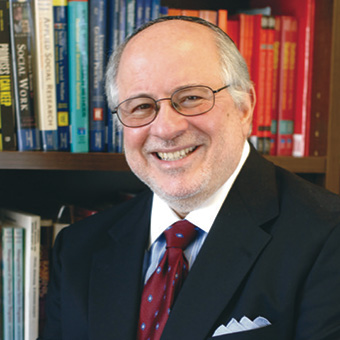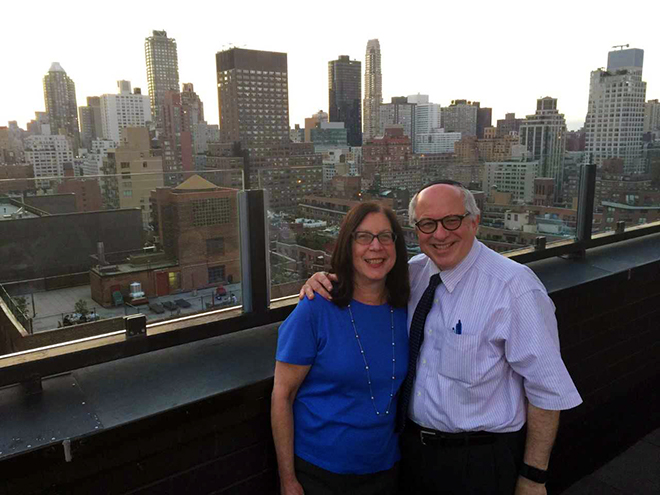When Dr. Bernard Lander, the founder of Touro College, approached me to establish the graduate school 12 years ago, I initially said no. There were, and are, many outstanding schools of social work in New York and Boston. How could we compete with those, and from scratch too?
When I was at Hornstein I also taught at the Boston University School of Social Work, and I always knew, through that experience at B.U., that New York could use another place like that. Like Hornstein, I found B.U. to be a warm, collegial place. I eventually told Dr. Lander yes. The initial obstacle, the core challenge, was how do you create another graduate school from scratch in a city that has the oldest schools of social work in the country including at Columbia, N.Y.U. and Hunter, and how do you find the turf?
The way I found the turf was through this notion of the two "C's" that I articulated earlier of Hornstein: care and competence. I think for that reason we've established a niche in New York and in fact, from the award we got from the federal government, it's been now nationally recognized and I owe it to Hornstein.
Hornstein wasn't just an academic experience. It was a community-building experience, and the reason my graduate school has been successful at Touro is that I don't just teach classes. There's more. We have about 40 full- and part-time faculty and field instructors, and we're always asking ourselves: How do we go the extra mile for the student? If a student loses his or her food stamps, for example, or if a student has an injury, what can we do to make that student's life a little easier?
We have one student, Louis, who jumped on a roadside bomb to save his platoon while serving in the Middle East. Louis was seriously wounded. When he won the Purple Heart and became my student, the V.A. wasn't paying his tuition on a timely basis. I said to him, forget the tuition; we'll work it out. You're a hero to America. The least I can do is deal with your tuition.
Again, that was part of the legacy of Bernie and all the wonderful Hornstein faculty. It's not enough to provide academic quality. You have to have a sense of family and community as well.
As for challenges I've not yet overcome, I still have two, and I'm working on them. The first is a program in Israel. I think there's room for this type of education in Israel but I've encountered a lot of roadblocks from various institutions there. I am still committed to establishing a program for African Americans, Hispanics, Jews and others to go study in Israel for a quality period of time at a very inexpensive rate. That's an unfinished challenge of mine, and I still intend to get there. I believe that at a time when Israel is being ridiculed and demeaned by the world, I want our multi-ethnic students to see first-hand the complexity of Israel. I'd like them to be able to make their own informed decisions about Israel and not be biased by what this reporter or that reporter has said, or this U.N. panel or that panel has said. That's a challenge that Touro's current president, Dr. Allan Kadish, and I have talked about. We haven't met that challenge yet, but I still intend to do so.
The other challenge I haven't quite met yet is to establish an undergraduate program in social work. Particularly because of the kind of student that I attract, students who come from underprivileged backgrounds, be they African American, Jewish or Hispanic, we can't wait until graduate school to work with these students. We have to start with them as undergraduates or in high school.
So I am still working at that and I haven't quite got there. But with the president of the university, we are actively seeking a way to establish a new type of undergraduate education for students who are at risk and will not fit into your average, undergraduate institution; students who are smart and motivated but who need a little extra support and help. That's yet an unmet challenge but I'm convinced we'll get there.
Can I tell you a word about my wife, Frieda? She is a Jewish educator par excellence. Frieda was honored a few years ago as the top Jewish educator in Bergen County, New Jersey, which has a huge Jewish population of a couple hundred thousand Jews. She's now a Jewish educator at Union for Reform Judaism and briefly met current Hornstein students who were at U.R.J. as part of their tour of Jewish nonprofits in New York City.
Frieda also had a sensational experience in the Jewish education track in Hornstein under Saul Wachs and Danny Margolis and continues to embody that legacy of caring and competence. We're both still at it, you know, with no plans to retire.
Each of our three kids, we think, are also committed to serving the Jewish people. Our oldest son, Daniel, is a physician and very active in his congregation in New Jersey. Our middle daughter, Shira, teaches at Ramaz School, so she's followed in Frieda's footsteps as a Jewish educator at Ramaz, which is a vibrant Jewish day school in New York. Our youngest, Jonathan, just finished law school. He was president of the Jewish Students Association at University of Michigan Law School. I'm very proud of him because last year he started a study program for Muslims, Christians and Jews… Sound familiar? [Laughs] They get together at the Law School and study sacred texts on refugees. I think all three of them, in their life and work, combine that Hornstein legacy of care and compassion and academic rigor.
 Steven Huberman, PhD’79
Steven Huberman, PhD’79 Frieda and Steven Huberman on their wedding anniversary.
Frieda and Steven Huberman on their wedding anniversary.